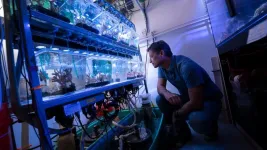(Press-News.org) MIAMI, FLORIDA (EMBARGOED UNTIL NOV. 9, 2023, AT 11 A.M. ET) – A multicenter study led by researchers at Sylvester Comprehensive Cancer Center at the University of Miami Miller School of Medicine shows how interactions between tumor cells and immune components of the microenvironment can impact treatment responses and outcomes in patients newly diagnosed with multiple myeloma who undergo combination treatments that include targeted immunotherapy.
New drugs developed over the past two decades have dramatically improved survival rates, with “deep” and sustained treatment responses associated with low rates of progression. Immunotherapies targeting a molecule, CD38, that is found on multiple myeloma cells have been particularly effective, but even with treatment regimens that include CD38-targeting, the disease fails to respond adequately or progresses prematurely in 30% to 50% of newly diagnosed patients.
“Since the introduction of advanced, targeted immunotherapy regimens, there has been a pressing need to better understand the tumor genomic and immune interactions that drive resistance to combination treatment approaches. This study adds significant information that will result in better clinical trials and more effective therapies for patients with high-risk disease,” said Dr. C. Ola Landgren, hematologist/oncologist, chief of the Division of Myeloma and director of the Myeloma Institute at Sylvester, and co-senior author of an article in Nature Cancer.
Some harmful changes occurring in the genetic makeup of tumor cells are driven by the tumors themselves; others may come about as immunotherapies change the treatment landscape, creating a moving target for researchers and clinicians. Many newly diagnosed patients are treated with therapies affecting the immune microenvironment.
Multiple myeloma, a cancer of plasma cells in the bone marrow, can damage bones and the immune system and often leads to kidney disorders. It affects 35,000 Americans every year, and, at the current time, over 170,000 people are living with multiple myeloma in the United States.
In this study, the researchers collected bone marrow samples from 49 patients who had been treated with combination drug therapy that included a CD38-targeting monoclonal antibody called daratumumab, or DKRd. They employed whole genome sequencing to look for chromosomal changes in tumor cells that could increase risk for treatment resistance, and they used single-cell RNA sequencing to analyze the tumor microenvironment – providing the first in-depth look at the relationship between the two.
“We found that stronger treatment responses and prolonged progression-free survival were driven by a complex interplay between tumor genomic features and immune microenvironment changes,” said Dr. Francesco Maura, a co-first author of the paper whose Sylvester laboratory conducts myeloma computational and translational research. “Interestingly, we found that with the introduction of immunotherapy, some historically important genomic prognostic factors lost some of their power to predict outcome and a number of genomic drivers and microenvironmental features emerged as being of importance.”
In the article, the researchers identify specific gene mutations and changes that impact clinical outcomes. They also describe immune-related factors and events that predict sustained treatment effects with prolonged survival.
Colleagues from Perlmutter Cancer Center at NYU Langone Health, Memorial Sloan Kettering Cancer Center and Weill Cornell Medical College collaborated on the study with the Sylvester researchers. Dr. Gareth Morgan at Perlmutter Cancer Center is co-senior author of the article. Sylvester’s Dr. David Coffey is a co-first author, as are Dr. Eileen Boyle, of Perlmutter, and Dr. Kylee Maclachlan, of MSK and Weill Cornell.
Authors: The journal article includes a full listing of authors and affiliations.
Funding: The study was funded by:
Leukemia and Lymphoma Society (Leukemia & Lymphoma Society),
U.S. Department of Health & Human Services | NIH | NCI | Division of Cancer Epidemiology and Genetics
National Cancer Institute (National Cancer Institute Division of Cancer Epidemiology and Genetics)
A full list of funding acknowledgements from the authors appears with the paper.
Conflicts of interest: A complete list of potential conflicts appears with the paper.
Article: Nature Cancer: Genomic and immune signatures predict clinical outcome in newly diagnosed multiple myeloma treated with immunotherapy regimens
DOI: 10.1038/s43018-023-00657-1
URL (will be live when the embargo lifts): https://www.nature.com/articles/s43018-023-00657-1
# # #
END
An international group of scientists has cautioned against reliance on mechanical cleanup devices as a means of addressing the plastic pollution crisis.
The researchers – comprising a number of the world’s foremost experts in plastic pollution – say they appreciate the clear and pressing need to tackle the millions of tonnes of waste that have already accumulated in the ocean and waterways.
However, they caution that plastic removal technologies used so far have shown varied efficiency in the amount of waste material they are able to collect, many have not been tested at all.
In fact, some have been shown to harm quantities of marine organisms – including ...
(San Antonio, November 9, 2023) — The National Science Foundation (NSF) has awarded Jessica Eise, an assistant professor of social and environmental challenges in the University of Texas at San Antonio Department of Communication, $425,000 for her project to explore how to create enduring change in environmental public behavior to support actions that will effectively address climate change and its impacts on society.
Despite four decades of climate change communication, the world has yet to see adequate public action and policymaker support to substantively address the challenge. Eise’s findings will empower ...
Women produce physiological data that is just as predictable as men, at least when it comes to skin temperature. This might seem like common sense, but variations in body signals due to menstrual cycles, such as temperature, were used as an excuse to keep women out of clinical studies for decades.
The data for the finding was gathered from a wearable device to continuously monitor the skin temperature of 600 people, half female and half male, over six months.
The team found that there were more differences between any ...
Vanderbilt University Medical Center (VUMC) and Duke University School of Medicine have been awarded a $1.25 million grant from the Gordon and Betty Moore Foundation for the project “Measuring Artificial Intelligence (AI) Maturity in Healthcare Organizations.”
Working with the Coalition for Health AI (CHAI) and the University of Iowa, a team of experts will leverage the grant to develop a maturity model framework. The project leads are Peter Embí, MD, MS, and Laurie Novak, ...
Doctoral students at nine New York City area graduate engineering programs will soon be able to take courses at each other’s institutions without any additional tuition, as part of a new multi-school agreement announced today.
The Inter-University Engineering Doctoral Consortium (IUEDC), led by NYU Tandon School of Engineering, encourages Ph.D. students to complement their primary program by taking courses of interest offered at different schools, providing access to specialty instruction and expertise that may not be available at their home universities. Students should be ...
An international team of scientists, led by University of Missouri’s Haojing Yan, used NASA’s James Webb Space Telescope (JWST) to discover 14 new transient objects during their time-lapse study of galaxy cluster MACS0416 — located about 4.3 billion light years from Earth — which they’ve dubbed as the “Christmas Tree Galaxy Cluster.”
“Transients are objects in space, like individual stars, that appear to suddenly brighten by orders of magnitudes and then fade away,” said Yan, an associate professor in the Department ...
Stories about troubling aspects of science’s past as well as some hopeful signs for its future are among the winners of the 2023 AAAS Kavli Science Journalism Awards.
Presenter Adam Rutherford and producer Ilan Goodman won a Gold Award in the Audio category for a BBC series on the eugenics movement and its continuing repercussions in the modern age. Ashley Smart of Undark magazine won the Gold Award in the Science Reporting In-Depth category for a piece on the lingering impact of scientific racism, including the appropriation of legitimate genetics research for extremist ends.
On a more ...
INDIANAPOLIS -- Regenstrief Institute informaticians and other data experts will share their research insights and innovations from November 11-15 at the 2023 American Medical Informatics Association (AMIA) Annual Symposium in New Orleans, Louisiana.
Two Regenstrief researchers also were part of the leadership team that organized and helped set the agenda for the conference, “Transforming Healthcare and Biomedicine for a Sustainable Future.”
AMIA’s Annual Symposium is the premier medical informatics event, presenting leading-edge scientific research and a wide array of scientific sessions. The symposium presents work from across the spectrum of the informatics ...
Washington, D.C.—High fiber diets, like those that include broccoli sprouts or other cruciferous vegetables, may reduce disease symptoms and improve quality of life in patients with inflammatory bowel disease (IBD), according to a study conducted in mice. The study was published in mSystems, a journal of the American Society for Microbiology.
In the study, the investigators used a popular interleukin-10-knockout (IL-10-KO) mouse model of Crohn’s to investigate the interactions between mice and their immune systems, as well as the broccoli ...
SEATTLE, W.A.—November 9, 2023—The Paul G. Allen Frontiers Group, a division of the Allen Institute, today announced the launch of the Allen Discovery Center (ADC) for Neuroimmune Interactions at the Icahn School of Medicine at Mount Sinai. The research team will comprehensively define and map the interactions between the nervous system and the immune system that take place distant from the brain, such as at the skin, lung, and gut surfaces, and analyze how these interactions relay a variety of sensations back to the brain and regulate organ physiology and tissue immune responses.
"Understanding ...





